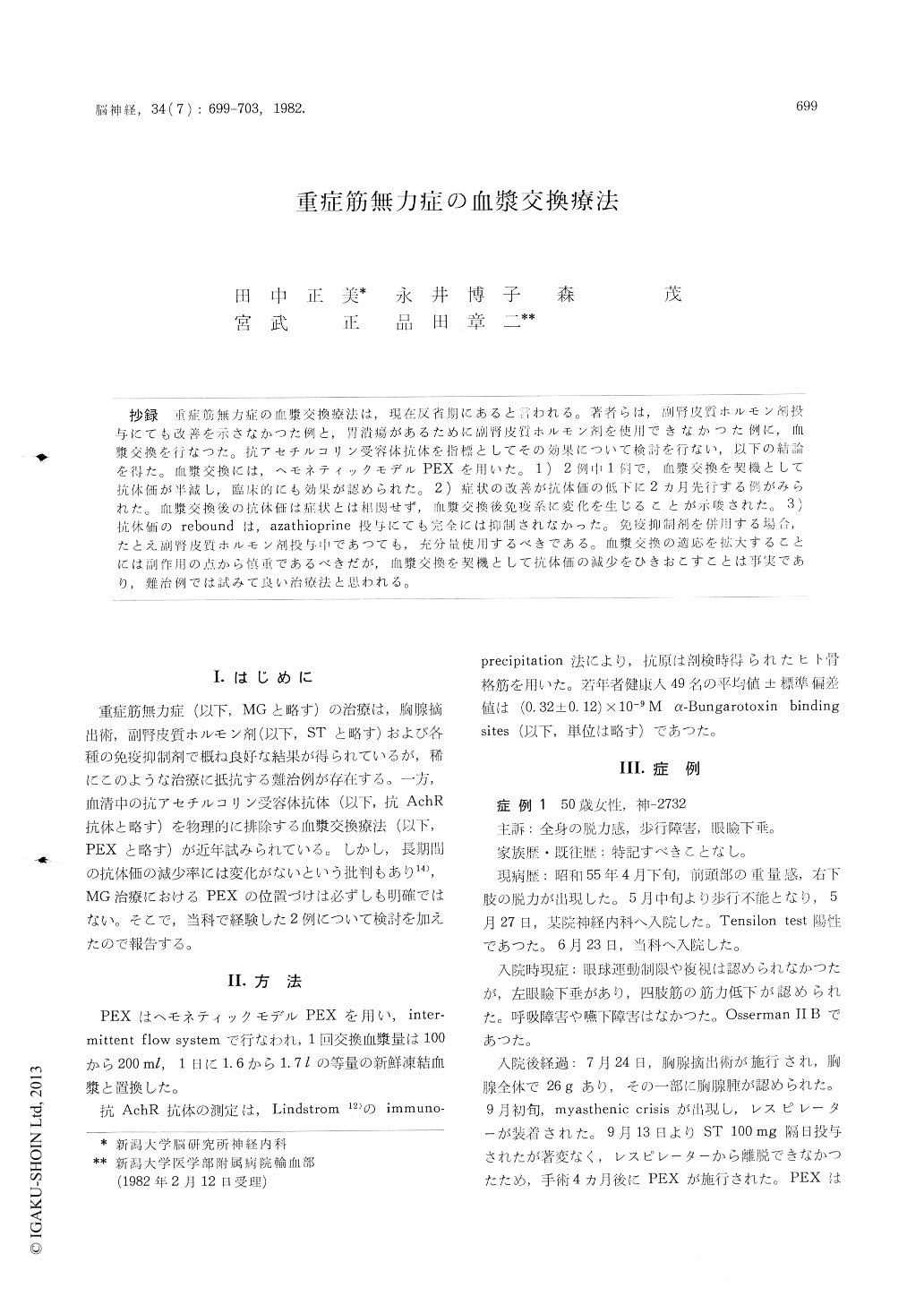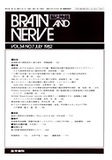Japanese
English
- 有料閲覧
- Abstract 文献概要
- 1ページ目 Look Inside
抄録 重症筋無力症の血漿交換療法は,現在反省期にあると言われる。著者らは,副腎皮質ホルモン剤投与にても改善を示さなかつた例と,胃潰瘍があるために副腎皮質ホルモン剤を使用できなかつた例に,血漿交換を行なつた。抗アセチルコリン受容体抗体を指標としてその効果について検討を行ない,以下の結論を得た。血漿交換には,ヘモネティックモデルPEXを用いた。1)2例中1例で,血漿交換を契機として抗体価が半減し,臨床的にも効果が認められた。2)症状の改善が抗体価の低下に2カ月先行する例がみられた。血漿交換後の抗体価は症状とは組関せず,血漿交換後免疫系に変化を生じることが示唆された。3)抗休価のreboundは,azathioprine投与にても完全には抑制されなかった。免疫抑制剤を併用する場合,たとえ副腎皮質ホルモン剤投与中であつても,充分量使用するべきである。血漿交換の適応を拡大することには副作用の点から慎重であるべきだが,血漿交換を契機として抗体価の減少をひきおこすことは事実であり,難治例では試みて良い治療法と思われる。
There are a few cases with myasthenia gravis who are resistant to the therapy such as thymec-tomy or glucocorticoid administration. Recently, plasma exchange is challenged to such patients. Despite first expectation, Newsom-Davis reported that the effect of plasma exchange was transient and the low level of acetylcholine receptor anti-bodies could not be kept for a long time by this procedure.
We tried plasma exchange therapy to two cases with myasthenia gravis who needed the assisted ventilation. Case 1 was not improved by thymec-tomy and glucocorticoid administration and case 2 could not be given glucocorticoid for suffering gastric ulcer. The titers of anti-acetylcholine re-ceptor antibodies are decreased to a half by plasma exchange in case 1 with the improvement of clinical states. Case 2 was improved by azathioprine, later. The half time implied the time when the level of antibody titer reached to the imtermediate be-tween the levels at preexchange and postexchange, was 8 days in case 1 and 11 days in case 2, which was not shortened. There were not marked hyper-production of anti-acetylcholine receptor antibodies. In general, it seems that the clinical improveme-nt follows the reproduction of acetylcholine receptors after the decline of antibody titers. However, the decline of antibody titers followed the clinical improvement within two months in case 2. There was not the correlation between clinical symptoms and antibody titers after plasma exchange in case 1. Therefore immunological state seem to change after plasma exchange. Azathioprine administration could not prevent the rebound of anti-acetylcholine receptor antibodies. Any side effects other than eczema, could not be observed.
Because of severe side effects, although rare, such as non A-non B hepatitis or anaphylaxis, we should be careful to select the cases. However, plasma exchange was sometimes effective to the cases who were not improved by thymectomy and glucocorti-coid administration.
The indication of plasma exchange for patients with myasthenia gravis should be as follows ; 1) resistant cases for glucocorticoid or immunosuppre-ssive agents administration, 2) initial therapy of acute severe cases, 3) myasthenic or cholinergic crisis, 4) improvement of respiratory function before operation.

Copyright © 1982, Igaku-Shoin Ltd. All rights reserved.


